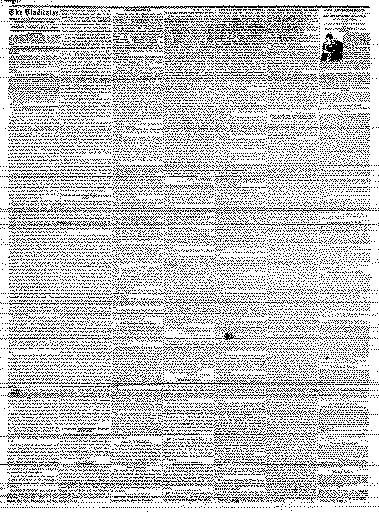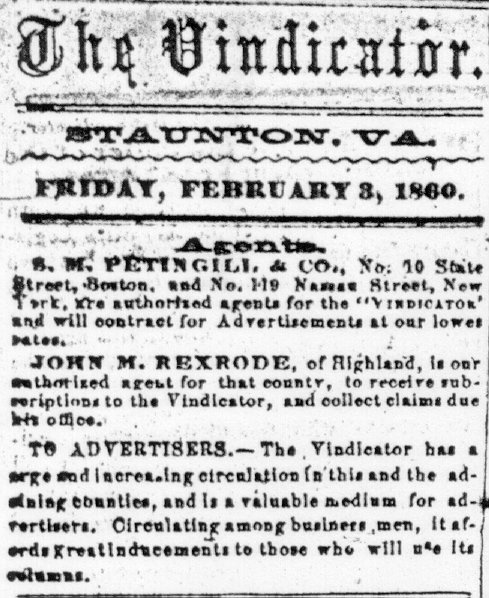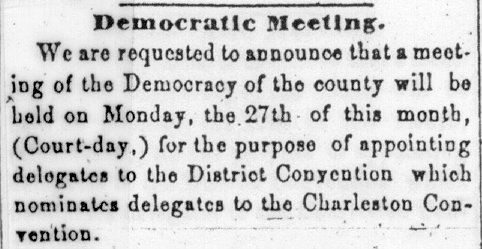|


Staunton Vindicator: Feb. 3, 1860, Page 2

|

Staunton Vindicator: Feb. 3, 1860, Page 2
|
|||||||
|
Column 1: Below the date of publication, the Vindicator provided a list of its "agents"--those authorized in various locales outside Staunton to contract advertising for the newspaper. Mail in 1860 was very slow and Staunton newspapers did not have free access to the telegraph. The most efficient and sensible system to contract out-of-town advertising, therefore, was for the paper to hire a number of agents, who were authorized by the paper and responsible for collecting advertisements from a given area, and have those agents transmit all the advertising they contracted at once. Most of column 1 was filled with the Vindicator's main editorial. Interestingly, only on very rare occasions did the Spectator and the Vindicator share the same topic in a lead editorial. Where the January 31 Spectator wrote about national politics, just three days later the Vindicator chose to focus attention on the issue of individual states trading directly with European nations. Partially, the difference in editorial topics reflected the three-day lag in publication. More often, however, it simply resulted from editors with different priorities when it came to national affairs, the usual subject of the main editorial. An issue that concerned one editor on a given week might be far from the mind of another editor in the very same town. This tendency was most likely to manifest itself in the lead editorial. Only on very rare occasions did the Spectator and the Vindicator share the same topic in a lead editorial. When it came to more local news, however, even though the papers diverged in their coverage, they would be more likely to have some obvious relationship to one another (see below). |
 |
|
Columns 2-6: These columns had no set pattern in which articles appeared. One could, however, safely assume that when Congress and the state legislature were in session, their proceedings appeared somewhere in these columns. In addition, other short editorials and political articles dealing with state or national affairs appeared here. At least half the space in these five columns, however, dealt with local politics and events, especially when the state and national legislatures were not meeting. With the exception of local advertisements, here was one of the rare places demonstrating that the Spectator and Vindicator published from the same town. During the week of January 30, for example, both announced that Turner's Cornet Band would give a concert on February 9. To some extent, the papers even overlapped in their coverage of local politics. For example, where the January 31 Spectator carried a letter to the editor publicly calling on candidates for sheriff to disavow any back-door dealing with potential deputies, the Vindicator had already published this letter on January 27, and published responses to it from a number of candidates on February 3. The Spectator would in turn publish these responses in its next issue. That the two papers published a number of days apart served to put their coverage of local events and politics somewhat out of sync. But over the course of a number of weeks, the papers frequently shared identical news, letters, and so on, especially when it came to local elections. |

|
|
In some ways, to suggest that the Vindicator and Spectator shared coverage of local events and politics is to state the obvious. They were, after all, published in the same town, despite dissimilar political opinions and priorities. However, even at the local level their coverage differed, particularly with respect to local activities for national parties. Where the Spectator was concerned primarily with Whig affairs, and, thus reported local Whig meetings, speeches, and activities, the Vindicator devoted its attention to Democratic matters. When no state or local elections were imminent, this difference was subtle, manifesting itself, for example, simply by a small announcement in the February 3 Vindicator of an upcoming meeting of local Democrats, an announcement which would not appear in the Spectator. The reverse was true for Whig or Opposition meetings--they were announced in the Spectator, not the Vindicator. When election time drew near, however, the difference was marked. Where the Spectator would be full of announcements of local Whig club meetings and speeches by prominent local Whigs, the Vindicator would do the same for the Democrats. Each for the most part ignored the other's actions, and, thus, left a somewhat eerie impression of a town dominated by a singular political mind. The reality, of course, was far more complicated. Column 7: Column 7 carried advertisements, often for local merchants, but sometimes for extralocal businesses, court-ordered land sales, and other items or events. |
|